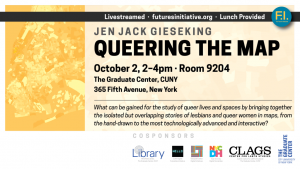Talk on 10/2: Queering the Map

I’m over the moon that 1) I do not have the flu as I did last February when I had to cancel this talk, and 2) I finally get to give this talk at my alma mater with the brilliant, wonderful people at the Futures Initiative. It will be great to share my thoughts on selecting the right tool to fit the right public humanities project, particularly in regards to multiple layers of data analysis and collaboration in my Queer Public Archives project. The detailed abstract is below.
WHERE: The Graduate Center, 365 Fifth Avenue
ROOM: 9204-9205
WHEN: October 2, 2015, 2:00 PM-4:00 PM
CONTACT INFO: futuresinitiative [at] gc.cuny.edu; (212) 817-7201
WATCH ONLINE: http://bit.ly/futuresed-live
RSVP NOW
HASHTAG: #futuresED
In The Practice of Everyday Life, de Certeau writes that “What the map cuts up, the story cuts across.” But what if the everyday stories you seek are already cut up by centuries of structural inequality and oppression, such as those of lesbians and queer women? In this talk on “Queering the Map,” Jack Gieseking investigates what can be gained for the study of queer lives and spaces by bringing together the isolated but overlapping stories of lesbians and queer women in maps, from the hand-drawn to the most technologically advanced and interactive.
Drawing upon qualitative and quantitative work on lesbians’ and queer women’s spaces and economies in New York City from 1983 to 2008—including multi-generational focus groups and mental maps, archival research and GIS—Gieseking works through three different types of mapping methods and platforms within a participatory action research framework. Through a close analysis of mental maps, and GIS maps made across platforms using QGIS, CartoDB, and TileMill/Mapbox, they suggest that the spatial and verbal can both obfuscate or illuminate understandings of everyday life. It is the queer practice of holding these seeming binaries in tension that reveals the most rich and complicated knowledge.